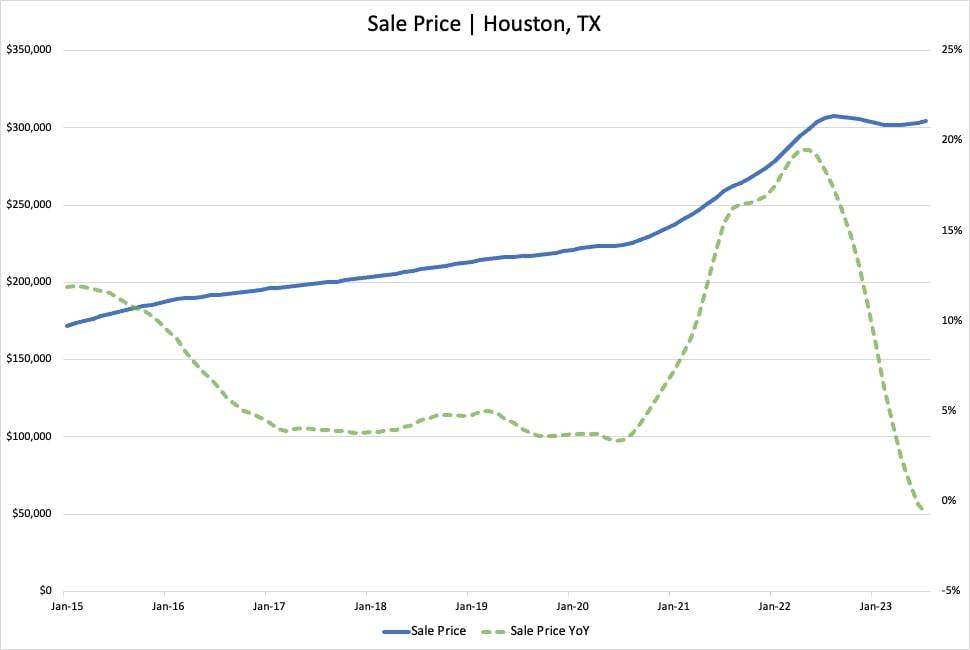Houston, located on the Texas coastline, is America’s fourth largest city. The metropolitan area is officially designated as Houston-The Woodlands-Sugar Land. The MSA features a very strong economy with deep roots in the energy industry, as well as space and industrial manufacturing. However, it’s also in the crosshairs of powerful hurricanes and has suffered billions of dollars in damage over the past few years alone. In turn, insurance has skyrocketed in the area, hurting the ability to cash flow in an otherwise affordable real estate market.
This article covers all of the key stats you need to know about Houston’s real estate market and whether you should invest in it or not.
Houston Population and Labor Market
Houston has added over 1.1 million residents over the last decade, making it the fourth largest city in the U.S. One of the reasons Houston has become such an inviting destination is the lure of good job opportunities with several Fortune 500 companies and a relatively low cost of living. Compared to its neighbor down the road, Austin, Houston’s housing prices are significantly cheaper and offer just as good of a lifestyle. As real estate investors, this is a great sign for continued growth.

As far as what the labor market looks like, Houston is home to energy giant ExxonMobil, as well as food distributor Sysco, tech-giant Hewlett Packard, and several other smaller energy companies like Occidental Petroleum and NRG Energy. There’s also a NASA Space Center.
The unemployment rate is currently trending higher than the national average, especially since the pandemic years, but historically, it has trended below, which shows that the underlying economy is strong.

Houston Home Prices
Home prices in Houston have grown tremendously since the beginning of 2020 but have since flattened, trending around $300k as of mid-2023. Prices reached a year-over-year growth peak of 18% in 2022 but have since fallen to 0%. While Houston hasn’t experienced a serious decrease in home prices, it’s not out of reach either.

One of the reasons home prices have remained so stable this year is due to the market’s inventory. Currently, the number of homes on the market has mirrored 2015 numbers.

Due to the growing population in Houston, new construction has been hot and has kept housing prices in check. In fact, Houston earned the title of “city with the most new homes” this year, with 23,000 units. To put that into perspective, New York City, with over double the population in its metro area, has only produced 14,000 units in 2023. As long as new construction continues at a steady pace and keeps up with the population, Houston should remain a relatively affordable market.
Houston Rent Prices
Rent in Houston has accelerated since 2020, now about $300 more on average than back then. The rapid increase can be attributed to an undersupply of rental housing, especially multifamily units. Back to the new construction data from above, over 65% of the new units built were single-family homes, which does a lot to reduce housing prices but might not change the trajectory of rental prices as much as you’d think.

Regardless, as investors, affordable homes that can be rented out at a premium are a good play and can lead to good cash flow.
Houston Cash Flow Prospects
Cash flow has been tough to come by in current economic conditions, but Houston does feature some pretty solid options for cash flow. With home prices below the national average and rental prices that continue to grow, there’s room for cash flow. However, there is one massive caveat with Houston: it’s hurricane and flooding risk.
Throughout the year, we’ve reported the growing concern investors are having about natural disaster-prone areas, and Houston happens to be in the center of all of it. Insurance carriers are pulling out of these at-risk locations, and the ones who are staying are jacking up the rates. That makes cash flowing in Houston a very challenging prospect.

Regardless, we’ll still show you the places that have some potential. In the map above, you’ll see the rent-to-price (RTP) ratio of each ZIP code, which is an indication of cash flow viability. Generally, you want to find an RTP ratio close to 1% when looking for cash flow. The top ZIP codes in Houston for RTP are:
- 77039 – Aldine (0.99%)
- 77028 – Houston Gardens (0.91%)
- 77029 – Jacinto City (0.88%)
Winning Strategies
Jodi Gauthier, an investor-friendly real estate agent in Houston, “is seeing success with first-time investors breaking into this market with house hacking on small multi-family units or single-family homes with an ADU (accessory dwelling unit). This allows them to get in with lower down payments than the standard 20-25% required on investment properties and utilize short-term or long-term rental strategies to offset the mortgage.”
If you’re interested in learning more about investing in Houston, partner with a local investor-friendly real estate agent like Jodi Gauthier, who can guide you through which strategies, tactics, and neighborhoods to focus on.
Here’s how to contact Gauthier on Agent Finder:
- Search “Houston, Texas”
- Enter your investment criteria
- Select Jodi Gauthier or other agents you want to contact
Jodi is a broker, founder of ThisIsLivin, and a real estate investor. With years of experience in various investment strategies, she has honed her skills in fix and flips, owner financing, buy and hold, small multi-family properties, BRRRR, sub-to, and short-term rentals.
She also owns a property management company and Design + Build firm—specializing in custom homes and renovations—which ensures that investments are expertly acquired, designed, managed, and marketed for optimal returns.
Find an Elite Agent in Minutes
Agent Finder makes it fast, free, and easy to find agents that know investing.
Match with market experts like Peter Stewart of Indi, Brandon Ribeiro in Philly, Dan Nelson in Chicago, and Jodi Gauthier of Houston.
Build your dream team now!
Note By BiggerPockets: These are opinions written by the author and do not necessarily represent the opinions of BiggerPockets.








